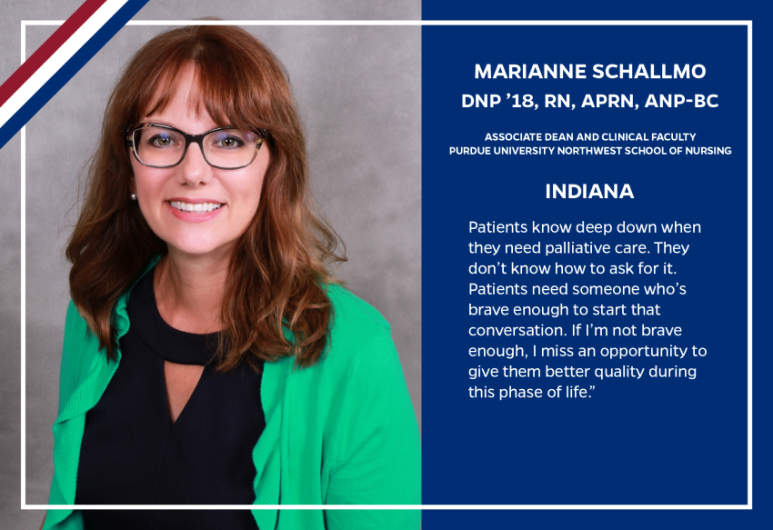All of us will die one day. Nothing can change that outcome. So, let’s talk about it, normalize it, and when that time comes, learn to make quality of life—not fear—our focus, insists Marianne Schallmo, associate dean and clinical faculty at Purdue University Northwest.
“It begins with knowledge,” explains Schallmo, a cardiovascular NP who had her mind expanded (and her own cardiac health tested) when her perspective Johns Hopkins DNP project addressing care of heart failure patients blew up in her face. “My DNP faculty advisor kept saying, ‘Nope. Nope. Nope.’
The problem, in her mentor’s eyes, was a blind spot in Schallmo’s: “You need to find out, what is the need in your community?”
Schallmo looked again, and it struck her. She had crafted a DNP project that was right in her own wheelhouse, her own comfort zone. She hadn’t considered palliative care, something she now discovered was desperately needed among those same heart-failure patients (and others). “The role I was filling as a nurse practitioner was not meeting the need. The palliation need was so great, and there was an underserved population right in my community.”
Her new DNP project would focus on education and action to make palliative care a standard part of nursing.
“There’s been this misconception. Patients hear ‘palliative care’ and think, ‘Hospice … I’m going to die.’”
Of course, Schallmo says, but maybe not just yet.
“There is such a taboo around death. We need to change the mindset. Palliative care is everybody’s job. These are normal conversations we are obligated to have with our patients and their families.”
But who starts them?
“Patients know deep down when they need palliative care. They don’t know how to ask for it. Patients need someone who’s brave enough to start that conversation. If I’m not brave enough, I miss an opportunity to give them better quality during this phase of life.”
So Schallmo has adopted a two-pronged approach to education on palliative care: the new nurses in Purdue University Northwest’s classes, of course, but also reaching out to existing health care workers. (“It can be difficult. I’m asking them to change their practice.”)
Cardiologists can also be behind the curve. Two such physicians said they’d support her DNP work but, as Schallmo says one cardiologist asked her, “With so many important things in cardiology, why would you do this?”
And just like that, her DNP faculty advisor’s meaning—and Schallmo’s new mission—became clear. “Again, it starts with knowledge,” she explains of a simulation-aided curriculum that offers nursing students a safe environment, then works to break down preconceived notions, address emotions head on, and let students practice the conversations they will one day have with real patients. Clinicals may offer a bit more exposure, with all such practice followed by debriefings, reflection, frank discussion, “unpacking feelings.” It can be a lot. “Some may need to leave the room to collect themselves.”
It’s a perfect time to enact such curriculum, she says, as it echoes the American Academy of College Nursing’s “The Essentials: Core Competencies for Professional Nursing Education.”
Education for working nurses includes keeping groups small, sharing demonstration videos, and discussion groups with a similar openness, “where we have those conversations with each other” so nurses can practice for the moment when they take the leap with actual patients and families.
“The more you can make them comfortable … palliative care conversations come only with practice,” says Schallmo, an Indiana native. “I was actually born in Gary. Everybody was born in Gary, because that’s where the hospital was.” But her true childhood home is “somewhere in the middle of the cornfields” … tiny Hebron, to be exact, and it’s where Schallmo’s parents remain. And from Hammond, home of Purdue University Northwest, you can hear her sing the praises of her DNP training for helping her become a target of recruiters and, once at Purdue, being promoted to positions that make use of her leadership. “Hopkins helped me find that niche and gave me the tools to be successful. I am equipped to make change and am comfortable and confident enough to handle whatever comes next.” — Steve St. Angelo
Click here to learn more about the programs at the Johns Hopkins School of Nursing.
Go to unitedstatesofnursing.org to see more stories in The United States of Nursing.
